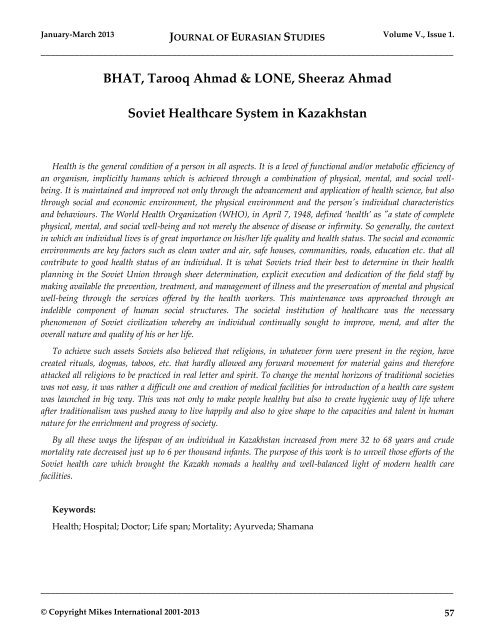JOURNAL OF EURASIAN STUDIES Journal of the Gábor Bálint de ...
JOURNAL OF EURASIAN STUDIES Journal of the Gábor Bálint de ...
JOURNAL OF EURASIAN STUDIES Journal of the Gábor Bálint de ...
Create successful ePaper yourself
Turn your PDF publications into a flip-book with our unique Google optimized e-Paper software.
January-March 2013 <strong>JOURNAL</strong> <strong>OF</strong> <strong>EURASIAN</strong> <strong>STUDIES</strong> Volume V., Issue 1.<br />
_____________________________________________________________________________________<br />
BHAT, Tarooq Ahmad & LONE, Sheeraz Ahmad<br />
Soviet Healthcare System in Kazakhstan<br />
Health is <strong>the</strong> general condition <strong>of</strong> a person in all aspects. It is a level <strong>of</strong> functional and/or metabolic efficiency <strong>of</strong><br />
an organism, implicitly humans which is achieved through a combination <strong>of</strong> physical, mental, and social wellbeing.<br />
It is maintained and improved not only through <strong>the</strong> advancement and application <strong>of</strong> health science, but also<br />
through social and economic environment, <strong>the</strong> physical environment and <strong>the</strong> person's individual characteristics<br />
and behaviours. The World Health Organization (WHO), in April 7, 1948, <strong>de</strong>fined ‘health’ as "a state <strong>of</strong> complete<br />
physical, mental, and social well-being and not merely <strong>the</strong> absence <strong>of</strong> disease or infirmity. So generally, <strong>the</strong> context<br />
in which an individual lives is <strong>of</strong> great importance on his/her life quality and health status. The social and economic<br />
environments are key factors such as clean water and air, safe houses, communities, roads, education etc. that all<br />
contribute to good health status <strong>of</strong> an individual. It is what Soviets tried <strong>the</strong>ir best to <strong>de</strong>termine in <strong>the</strong>ir health<br />
planning in <strong>the</strong> Soviet Union through sheer <strong>de</strong>termination, explicit execution and <strong>de</strong>dication <strong>of</strong> <strong>the</strong> field staff by<br />
making available <strong>the</strong> prevention, treatment, and management <strong>of</strong> illness and <strong>the</strong> preservation <strong>of</strong> mental and physical<br />
well-being through <strong>the</strong> services <strong>of</strong>fered by <strong>the</strong> health workers. This maintenance was approached through an<br />
in<strong>de</strong>lible component <strong>of</strong> human social structures. The societal institution <strong>of</strong> healthcare was <strong>the</strong> necessary<br />
phenomenon <strong>of</strong> Soviet civilization whereby an individual continually sought to improve, mend, and alter <strong>the</strong><br />
overall nature and quality <strong>of</strong> his or her life.<br />
To achieve such assets Soviets also believed that religions, in whatever form were present in <strong>the</strong> region, have<br />
created rituals, dogmas, taboos, etc. that hardly allowed any forward movement for material gains and <strong>the</strong>refore<br />
attacked all religions to be practiced in real letter and spirit. To change <strong>the</strong> mental horizons <strong>of</strong> traditional societies<br />
was not easy, it was ra<strong>the</strong>r a difficult one and creation <strong>of</strong> medical facilities for introduction <strong>of</strong> a health care system<br />
was launched in big way. This was not only to make people healthy but also to create hygienic way <strong>of</strong> life where<br />
after traditionalism was pushed away to live happily and also to give shape to <strong>the</strong> capacities and talent in human<br />
nature for <strong>the</strong> enrichment and progress <strong>of</strong> society.<br />
By all <strong>the</strong>se ways <strong>the</strong> lifespan <strong>of</strong> an individual in Kazakhstan increased from mere 32 to 68 years and cru<strong>de</strong><br />
mortality rate <strong>de</strong>creased just up to 6 per thousand infants. The purpose <strong>of</strong> this work is to unveil those efforts <strong>of</strong> <strong>the</strong><br />
Soviet health care which brought <strong>the</strong> Kazakh nomads a healthy and well-balanced light <strong>of</strong> mo<strong>de</strong>rn health care<br />
facilities.<br />
Keywords:<br />
Health; Hospital; Doctor; Life span; Mortality; Ayurveda; Shamana<br />
_____________________________________________________________________________________<br />
© Copyright Mikes International 2001-2013 57

















